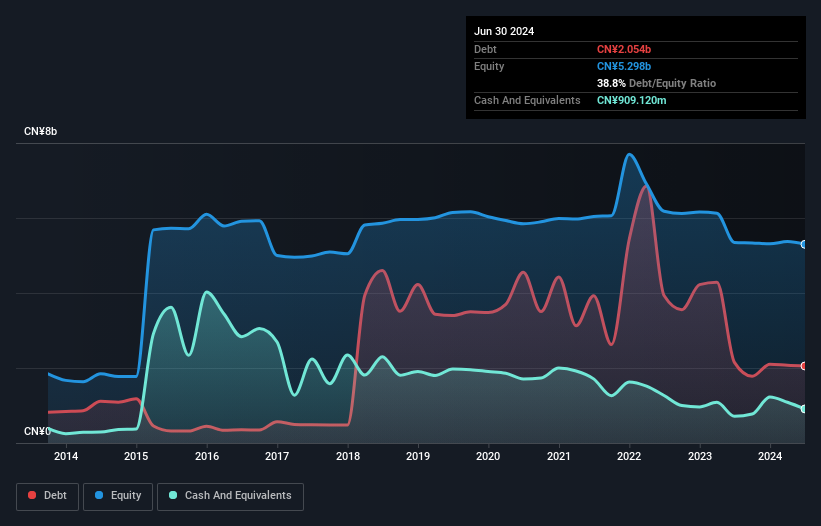Would Beijing Sanyuan Foods (SHSE:600429) Be Better Off With Less Debt?

Legendary fund manager Li Lu (who Charlie Munger backed) once said, 'The biggest investment risk is not the volatility of prices, but whether you will suffer a permanent loss of capital.' So it might be obvious that you need to consider debt, when you think about how risky any given stock is, because too much debt can sink a company. As with many other companies Beijing Sanyuan Foods Co., Ltd. (SHSE:600429) makes use of debt. But the real question is whether this debt is making the company risky.
What Risk Does Debt Bring?
Debt and other liabilities become risky for a business when it cannot easily fulfill those obligations, either with free cash flow or by raising capital at an attractive price. Ultimately, if the company can't fulfill its legal obligations to repay debt, shareholders could walk away with nothing. However, a more common (but still painful) scenario is that it has to raise new equity capital at a low price, thus permanently diluting shareholders. Of course, the upside of debt is that it often represents cheap capital, especially when it replaces dilution in a company with the ability to reinvest at high rates of return. The first step when considering a company's debt levels is to consider its cash and debt together.
View our latest analysis for Beijing Sanyuan Foods
What Is Beijing Sanyuan Foods's Net Debt?
As you can see below, Beijing Sanyuan Foods had CN¥2.05b of debt at June 2024, down from CN¥2.15b a year prior. However, it also had CN¥909.1m in cash, and so its net debt is CN¥1.14b.

How Healthy Is Beijing Sanyuan Foods' Balance Sheet?
The latest balance sheet data shows that Beijing Sanyuan Foods had liabilities of CN¥3.82b due within a year, and liabilities of CN¥290.1m falling due after that. On the other hand, it had cash of CN¥909.1m and CN¥1.08b worth of receivables due within a year. So it has liabilities totalling CN¥2.12b more than its cash and near-term receivables, combined.
This deficit isn't so bad because Beijing Sanyuan Foods is worth CN¥5.45b, and thus could probably raise enough capital to shore up its balance sheet, if the need arose. But we definitely want to keep our eyes open to indications that its debt is bringing too much risk. When analysing debt levels, the balance sheet is the obvious place to start. But it is Beijing Sanyuan Foods's earnings that will influence how the balance sheet holds up in the future. So if you're keen to discover more about its earnings, it might be worth checking out this graph of its long term earnings trend.
Over 12 months, Beijing Sanyuan Foods made a loss at the EBIT level, and saw its revenue drop to CN¥7.5b, which is a fall of 6.0%. That's not what we would hope to see.
Caveat Emptor
Importantly, Beijing Sanyuan Foods had an earnings before interest and tax (EBIT) loss over the last year. To be specific the EBIT loss came in at CN¥13m. When we look at that and recall the liabilities on its balance sheet, relative to cash, it seems unwise to us for the company to have any debt. Quite frankly we think the balance sheet is far from match-fit, although it could be improved with time. Surprisingly, we note that it actually reported positive free cash flow of CN¥153m and a profit of CN¥156m. So if we focus on those metrics there seems to be a chance the company will manage its debt without much trouble. When analysing debt levels, the balance sheet is the obvious place to start. But ultimately, every company can contain risks that exist outside of the balance sheet. For example - Beijing Sanyuan Foods has 1 warning sign we think you should be aware of.
Of course, if you're the type of investor who prefers buying stocks without the burden of debt, then don't hesitate to discover our exclusive list of net cash growth stocks, today.
Valuation is complex, but we're here to simplify it.
Discover if Beijing Sanyuan Foods might be undervalued or overvalued with our detailed analysis, featuring fair value estimates, potential risks, dividends, insider trades, and its financial condition.
Access Free AnalysisHave feedback on this article? Concerned about the content? Get in touch with us directly. Alternatively, email editorial-team (at) simplywallst.com.
This article by Simply Wall St is general in nature. We provide commentary based on historical data and analyst forecasts only using an unbiased methodology and our articles are not intended to be financial advice. It does not constitute a recommendation to buy or sell any stock, and does not take account of your objectives, or your financial situation. We aim to bring you long-term focused analysis driven by fundamental data. Note that our analysis may not factor in the latest price-sensitive company announcements or qualitative material. Simply Wall St has no position in any stocks mentioned.
About SHSE:600429
Beijing Sanyuan Foods
Produces, processes, and sells dairy products, cold drinks, beverages, and food products in China.
Adequate balance sheet and slightly overvalued.
Market Insights
Community Narratives




